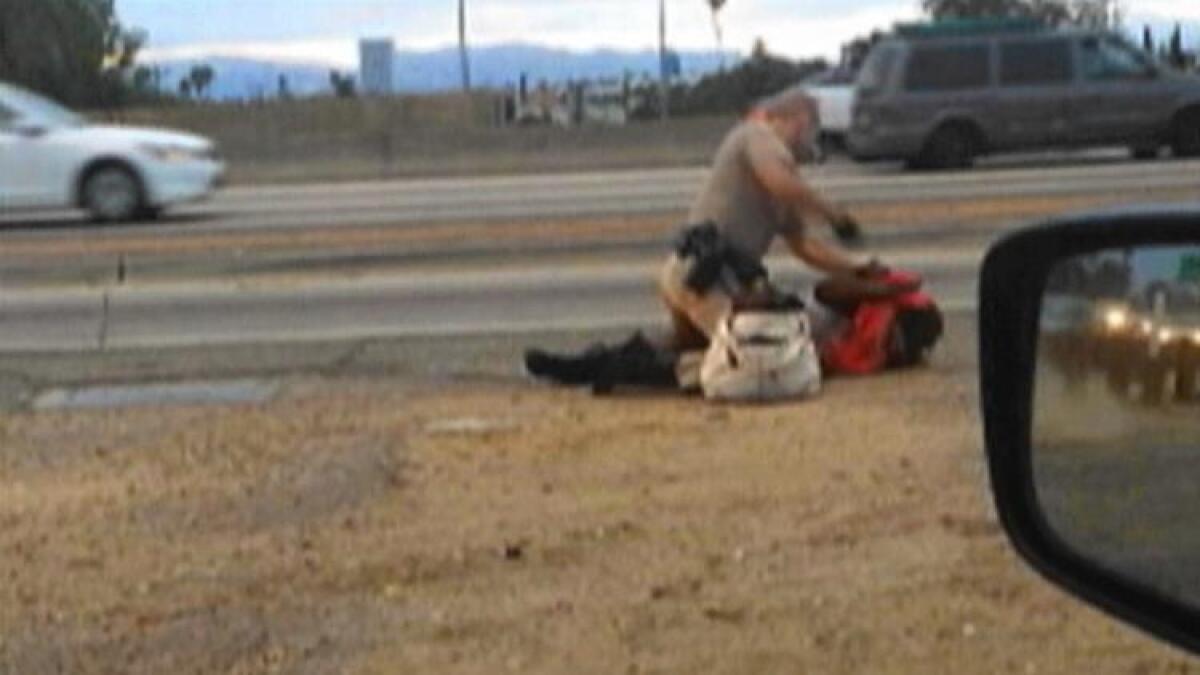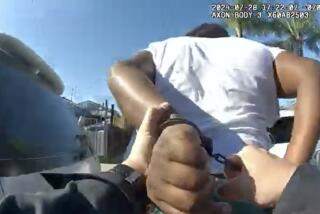Editorial: CHP beating video spotlights a problem that needs more attention

The video is jarring in its brutality: A California Highway Patrol officer kneels on Marlene Pinnock, a 51-year-old homeless woman, and punches her repeatedly in the head. But wait — haven’t we seen this movie before? In 2011, Fullerton police beat to death Kelly Thomas, a mentally ill homeless man, on camera. (A jury cleared two former officers of criminal wrongdoing in January.)
Solid statistics are hard to come by on the numbers of mentally ill people — or people facing other personal crises — who are killed or beaten by police each year. Overall acts of violence are tallied by the Department of Justice, but there is no specific reporting on violence against the mentally ill. Yet with a steady flow of news reports about confrontations between police and the mentally ill, it’s clear this is a real and ongoing problem. Indeed, many of the cases of excessive force in the Los Angeles County jails in recent years have involved altercations between sheriff’s deputies and mentally ill inmates. And just a few days before the Pinnock tape surfaced last week, a mentally ill man, Carlos Ocana, fell to his death from a skid row rooftop after police Tasered him.
Videos shot by passersby don’t always tell the full story, and it’s possible that the freeway beating video misses some important information about the interaction. CHP officials say Pinnock was moving into traffic on the 10 Freeway and that the unidentified officer intervened to stop her, which is exactly what the public expects its police to do. But the video shows the officer, as the woman is pinned beneath him out of traffic, delivering at least nine punches to her head. It’s hard to envision an unrecorded element of the incident that would justify that level of force.
Training would seem to be the foundational element here. CHP requires its officers to undergo eight hours of crisis intervention training that includes identifying and dealing with the mentally ill. Other departments have different standards and training requirements. But what exactly is the training? Who conducts it: departmental peers or independent experts? And who sets the standards? There needs to be a broad reevaluation.
L.A. County Dist. Atty. Jackie Lacey has been exploring alternative ways of prosecuting mentally ill defendants, and programs in Seattle, Memphis, Tenn., and elsewhere are already diverting some of them into treatment programs rather than jailing them. But that first contact with police seems to be a particularly pressing issue. The Legislature needs to confront this problem, crafting laws to standardize training based on the best practices recommended by mental health and law enforcement experts.
Follow the Opinion section on Twitter @latimesopinion
More to Read
A cure for the common opinion
Get thought-provoking perspectives with our weekly newsletter.
You may occasionally receive promotional content from the Los Angeles Times.









